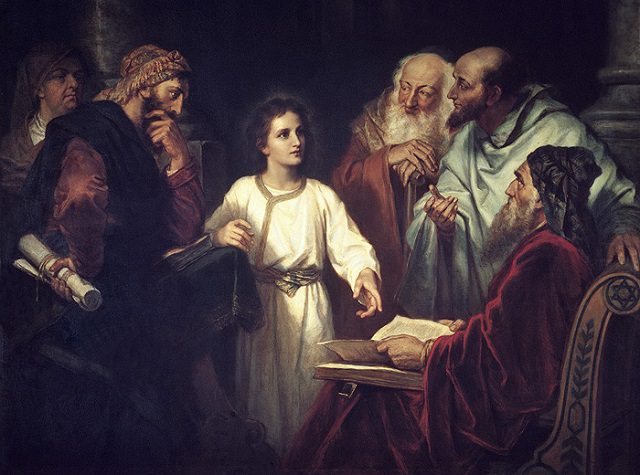. . . Which in Turn Was Derived from the Deuterocanon (So-Called “Apocrypha”)

Jesus among the Doctors (1884), by Heinrich Hofmann (1824-1911) [public domain / Wikimedia Commons]
***
John 10:22-23 (RSV) It was the feast of the Dedication at Jerusalem; [23] it was winter, and Jesus was walking in the temple, in the portico of Solomon.
feast of the dedication: Also called ‘Hanukkah’. It is an eight-day winter festival that celebrates Israel’s deliverance from Syrian oppression as well as Judas Maccabeus’ cleansing and rededication of the Jerusalem Temple in 164 B. C. (1 Mac 4:36-59; 2 Mac 10:1-8).
This feast commemorates an episode in Jewish history (cf. 1 Mac 4:36–59; 2 Mac 1–2:19; 10:1–8) when Judas Maccabeus, in the year 165 B.C., after liberating Jerusalem from the control of the Seleucid kings of Syria, cleansed the temple of the profanations of Antiochus Epiphanes (1 Mac 1:54). From then onwards, on the twenty-fifth day of the month of Kisleu (November–December) and throughout the following week, all Judea celebrated the anniversary of the dedication of the new altar. It was also known as the “festival of lights” because it was customary to light lamps, a symbol of the Law, and put them in the windows of the houses (cf. 2 Mac 1:18).
This festival called in Hebrew hanukkah was instituted by Judas Maccabeus, 1 Mac 4:52; 2 Mac 10:5, as an eight-day solemnity beginning on 25 Casleu (Kislev), the ninth month of the Jewish year — therefore opening approximately about the third week of December. As commemorating the renewal of worship in the temple in 165 B.C., after the profanations of Antiochus Ephiphanes, it held an important place in the festal calendar. Having presumably occupied the time between Tabernacles and Dedication in the Judaean and Transjordanian ministry which Lk 9:15–11:13 probably records in the main, Jesus came to Jerusalem for this feast.
The Greek word (ἐγκαίνια) which we have translated dedication, properly signifies renovations; because the temple, which had been polluted, was again consecrated by the command of Judas Maccabaeus; and at that time it was enacted that the day of the new dedication or consecration should be celebrated every year as a festival, that the people might recall to remembrance the grace of God, which had put an end to the tyranny of Antiochus.
Matthew 5:17-18 Think not that I have come to abolish the law and the prophets; I have come not to abolish them but to fulfil them. [18] For truly, I say to you, till heaven and earth pass away, not an iota, not a dot, will pass from the law until all is accomplished.
2) Jesus in effect, acknowledges in this instance, a history and Jewish tradition exclusively documented in the deuterocanon (but not in the other 39 books of the Old Testament, that Protestants accept as canon, since it occurred after the completion of it). It’s an instance of an indirect appeal (by virtue of His actions: attending the feast) to a tradition not in (according to Protestants) Scripture at all, since they reject the canonicity of the deuterocanon. For Catholics, it is a scriptural feast and observance. Whether scriptural or not, Jesus observed it. And this particular feast was not technically part of Mosaic Law, but rather, a “late” Jewish tradition. It’s part of the Catholic Bible, but for Protestants, it is an “unbiblical” tradition of [Jewish] men.
3) An aspect of #2 is the notion that Jesus supposedly only cited and/or acknowledged as authoritative written traditions from the Old Testament (defined as the Protestant 39 books) and none from other ancient Jewish books or from Jewish oral tradition. This is untrue, as I have shown elsewhere.













